- Home
- Natalia Ginzburg
The Little Virtues Page 5
The Little Virtues Read online
Page 5
He does not help me get over my indecisiveness, or the way I hesitate before doing anything, or my sense of guilt. He tends to make fun of every tiny thing I do. If I go shopping in the market he follows me and spies on me. He makes fun of the way I shop, of the way I weigh the oranges in my hand unerringly choosing, he says, the worst in the whole market; he ridicules me for spending an hour over the shopping, buying onions at one stall, celery at another and fruit at another. Sometimes he does the shopping to show me how quickly he can do it; he unhesitatingly buys everything from one stall and then manages to get the basket delivered to the house. He doesn’t buy celery because he cannot abide it.
And so—more than ever—I feel I do everything inadequately or mistakenly. But if l once find out that he has made a mistake I tell him so over and over again until he is exasperated. I can be very annoying at times.
His rages are unpredictable, and bubble over like the head on beer. My rages are unpredictable too, but his quickly disappear whereas mine leave a noisy nagging trail behind them which must be very annoying—like the complaining yowl of a cat.
Sometimes in the midst of his rage I start to cry, and instead of quietening him down and making him feel sorry for me this infuriates him all the more. He says my tears are just play-acting, and perhaps he is right. Because in the middle of my tears and his rage I am completely calm.
I never cry when I am really unhappy.
There was a time when I used to hurl plates and crockery on the floor during my rages. But not anymore. Perhaps because·I am older and my rages are less violent, and also because I dare not lay a finger on our plates now; we bought them one day in London, in the Portobello Road, and I am very fond of them.
The price of those plates, and of many other things we have bought, immediately underwent a substantial reduction in his memory. He likes to think he did not spend very much and that he got a bargain. I know the price of that dinner service—it was £16, but he says £12. And it is the same with the picture of King Lear that is in our dining room, and which he also bought in the Portobello Road (and then cleaned with onions and potatoes); now he says he paid a certain sum for it, but I remember that it was much more than that.
Some years ago he bought twelve bedside mats in a department store. He bought them because they were cheap, and he thought he ought to buy them; and he bought them as an argument against me because he considered me to be incapable of buying things for the house. They were made of mud-coloured matting and they quickly became very unattractive; they took on a corpse-like rigidity and were hung from a wire line on the kitchen balcony, and I hated them. I used to remind him of them, as an example of bad shopping; but he would say that they had cost very little indeed, almost nothing. It was a long time before I could bring myself to throw them out—because there were so many of them, and because just as I was about to get rid of them it occurred to me that I could use them for rags. He and I both find throwing things away difficult; it must be a kind of Jewish caution in me, and the result of my extreme indecisiveness; in him it must be a defence against his impulsiveness and open-handedness.
He buys enormous quantities of bicarbonate of soda and aspirins.
Now and again he is ill with some mysterious ailment of his own; he can’t explain what he feels and stays in bed for a day completely wrapped up in the sheets; nothing is visible except his beard and the tip of his red nose. Then he takes bicarbonate of soda and aspirins in doses suitable for a horse, and says that I cannot understand because I am always well, I am like those great fat strong friars who go out in the wind and in all weathers and come to no harm; he on the other hand is sensitive and delicate and suffers from mysterious ailments. Then in the evening he is better and goes into the kitchen and cooks himself tagliatelle.
When he was a young man he was slim, handsome and finely built; he did not have a beard but long, soft moustaches instead, and he looked like the actor Robert Donat. He was like that about twenty years ago when I first knew him, and I remember that he used to wear an elegant kind of Scottish flannel shirt. I remember that one evening he walked me back to the pensione where I was living; we walked together along the Via Nazionale. I already felt that I was very old and had been through a great deal and had made many mistakes, and he seemed a boy to me, light years away from me. I don’t remember what we talked about on that evening walking along the Via Nazionale; nothing important, I suppose, and the idea that we would become husband and wife was light years away from me. Then we lost sight of each other, and when we met again he no longer looked like Robert Donat, but more like Balzac. When we met again he still wore his Scottish shirts but on him now they looked like garments for a polar expedition; now he had his beard and on his head he wore his ridiculous crumpled woollen hat; everything about him put you in mind of an imminent departure for the North Pole. Because, although he always feels hot, he has the habit of dressing as if he were surrounded by snow, ice and polar bears; or he dresses like a Brazilian coffee-planter, but he always dresses differently from everyone else.
If l remind him of that walk along the Via Nazionale he says he remembers it, but I know he is lying and that he remembers nothing; and I sometimes ask myself if it was us, these two people, almost twenty years ago on the Via Nazionale; two people who conversed so politely, so urbanely, as the sun was setting; who chatted a little about everything perhaps and about nothing; two friends talking, two young intellectuals out for a walk; so young, so educated, so uninvolved, so ready to judge one another with kind impartiality; so ready to say goodbye to one another for ever, as the sun set, at the corner of the street.
Part Two
The Son of Man
There has been a war and people have seen so many houses reduced to rubble that they no longer feel safe in their own homes which once seemed so quiet and secure. This is something that is incurable and will never be cured no matter how many years go by. True: we have a lamp on the table again, and a little vase of flowers, and pictures of our loved ones, but we can no longer trust any of these things because once, suddenly, we had to leave them behind, or because we have searched through the rubble for them in vain.
It is useless to believe that we could recover from twenty years like those we have been through. Those of us who have been fugitives will never be at peace. A ring at the door-bell in the middle of the night can only mean the word ‘police’ to us. And it is useless for us to tell ourselves over and over again that behind the word ‘police’ there are now friendly faces from whom we can ask for help and protection. This word always fills us with fear and suspicion. When I look at my sleeping children I think with relief that I will not have to wake them and run off into the night. But it is not a deep, lasting relief. It always seems to me that some day or other we shall once again have to get up and run off in the middle of the night, and leave everything—the quiet rooms, our letters, mementoes, clothes—behind us.
Once the experience of evil has been endured it is never forgotten. Someone who has seen a house collapse knows only too clearly what frail things little vases of flowers and pictures and white walls are. He knows only too well what a house is made of. A house is made of bricks and mortar and can collapse. A house is not particularly solid. It can collapse from one moment to the next. Behind the peaceful little vases of flowers, behind the teapots and carpets and waxed floors there is the other true face of a house—the hideous face of a house that has been reduced to rubble.
We shall not get over this war. It is useless to try. We shall never be people who go peacefully about their business, who think and study and manage their lives quietly. Something has happened to our houses. Something has happened to us. We shall never be at peace again.
We have seen reality’s darkest face, and it no longer horrifies us. And there are still those who complain that writers use bitter, violent language, that they write about cruel, distressing things, that they present reality in the worst possible light.
We cannot lie in our books and we can
not lie in any of the things we do. And perhaps this is the one good thing that has come out of the war. Not to lie, and not ·to allow others to lie to us. Such is the nature of the young now, of our generation. Those who are older than us are still too fond of falsehoods, of the veils and masks with which they hide reality. Our language saddens and offends them. They do not understand our attitude to reality. We are close to the truth of things. This is the only good the war has given us, but it has given it only to the young. It has given nothing but fear and a sense of insecurity to the old. And we who are young are also afraid, we also feel insecure in our homes, but we are not made defenceless by this fear. We have a toughness and strength which those who are older than us have never known.
For some the war started only with the war, with houses reduced to rubble and with the Germans, but for others it started as long ago as the first years of Fascism, and consequently for them the feeling of insecurity and constant danger is far greater. Danger, the feeling that you must hide, the feeling that—without warning—you will have to leave the warmth of your bed and your house, for many of us all this started many years ago. It crept into our childish games, followed us to our desks at school and taught us to see enemies everywhere. This is how it was for many of us in Italy, and elsewhere, and we believed that one day we would be able to walk without anxiety down the streets of our own cities, but now that we can perhaps walk there without anxiety we realize that we shall never be cured of this sickness. And so we are constantly forced to seek out a new strength, a new toughness with which to face whatever reality may confront us. We have been driven to look for an inward peace which is not the product of carpets and little vases of flowers.
There is no peace for the son of man. The foxes and the wolves have their holes, but the son of man hath not where to lay his head. Our generation is a generation of men. It is not a generation of foxes and wolves. Each of us would dearly like to rest his head somewhere, to have a little warm, dry nest. But there is no peace for the son of man. Each of us at some time in his life has had the illusion that he could sleep somewhere safely, that he could take possession of some certainty, some faith, and there rest his limbs. But all the certainties of the past have been snatched away from us, and faith has never after all been a place for sleeping in.
And we are a people without tears. The things that moved our parents do not move us at all. Our parents and those older than us disapprove of the way we bring up our children. They would like us to lie to our children as they lied to us. They would like our children to play with woolly toys in pretty pink rooms with little trees and rabbits painted on the walls. They would like us to surround their infancy with veils and lies, and carefully hide the truth of things from them. But we cannot do this. We cannot do this to children whom we have woken in the middle of the night and tremblingly dressed in the darkness so that we could flee with them or hide them, or simply because the air-raid sirens were lacerating the skies. We cannot do this to children who have seen terror and horror in our faces. We cannot bring ourselves to tell these children that we found them under cabbages, or that when a person dies he goes on a long journey.
There is an unbridgeable abyss between us and the previous generation. The dangers they lived through were trivial and their houses were rarely reduced to rubble. Earthquakes and fires were not phenomena that happened constantly and to everyone. The women did their knitting and told the cook what to make for lunch and invited their friends to houses that did not collapse. Everyone thought and studied and managed his life quietly. It was a different time and probably very fine in its way. But we are tied to our suffering, and at heart we are glad of our destiny as men.
My Vocation
My vocation is to write and I have known this for a long time. I hope I won’t be misunderstood; I know nothing about the value of the things I am able to write. I know that writing is my vocation. When I sit down to write I feel extraordinarily at ease, and I move in an element which, it seems to me, I know extraordinarily well; I use tools that are familiar to me and they fit snugly in my hands. If I do something else, if I study a foreign language or try to learn history or geography or shorthand or if I try and speak in public or take up knitting or go on a journey, I suffer and constantly ask myself how others do these things: it always seems to me that there must be some correct way of doing these things which others know about and I don’t. And it seems to me that I am deaf and blind and I feel a sort of sickness in the pit of my stomach. But when I write I never imagine that there is perhaps a better way of writing which other writers follow. I am not interested in what other writers do. But here I had better make it plain that I can only write stories. If I try to write a critical essay or an article that has been commissioned for a newspaper I don’t do it very well. I have to search laboriously, as it were outside myself, for what I am writing now. I can do it a little better than I can learn a foreign language or speak in public, but only a little better. And I always feel that I am cheating the reader with words that I have borrowed or filched from various places. I suffer and feel that I am in exile. But when I write stories I am like someone who is in her own country, walking along streets that she has known since she was a child, between walls and trees that are hers. My vocation is to write stories—invented things or things which I can remember from my own life, but in any case stories, things that are concerned only with memory and imagination and have nothing to do with erudition. This is my vocation and I shall work at it till I die. I am very happy with my vocation and I would not change it for anything in the world. I realized that it was my vocation a long time ago. Between the ages of five and ten I was still unsure, and sometimes I imagined that I would be a painter, sometimes that I would ride out on horseback and conquer countries, sometimes that I would invent new machines that would be very important. But I have known since I was ten, and I worked as hard as I could at poems and novels. I still have those poems. The first poems are clumsy and they have errors of versification in them, but they are quite pleasant; and then, little by little, as time passed I wrote poems that became less and less clumsy but more and more boring and silly. However I didn’t know this and I was ashamed of the clumsy poems, while those that were silly and not so clumsy seemed to me to be very beautiful, and I used to think that one day some famous poet would discover them and have them published and write long articles about me; I imagined the words and phrases of those articles and I composed them, from beginning to end, in my head. I imagined that I would win the Fracchia prize. I had heard that there was such a prize for writers. As I was unable to publish my poems in a book, since I didn’t know any famous poets, I copied them neatly into an exercise book and drew a little flower on the title page and made an index and everything. It became very easy for me to write poems. I wrote about one a day. I realized that if I didn’t want to write it was enough for me to read some poems by Pascoli or Gozzano or Corazzini and then I immediately wanted to. My poems came out as imitation Pascoli or imitation Gozzano or imitation Corazzini and then finally very imitation D’Annunzio when I found out that he also existed. However I never thought that I would write poetry all my life. I wanted to write novels sooner or later. I wrote three or four during those years. There was one called Marion or the Gipsy Girl, another called Molly and Dolly (a humorous detective story) and another called A Woman (à la D’Annunzio; in the second person; the story of a woman abandoned by her husband; I remember that there was also a cook who was a negress) and then one that was very long and complicated with terrible stories of kidnapped girls and carriages so that I was too afraid to write it when I was alone in the house: I can remember nothing about it except that there was one phrase which pleased me very much and that tears came into my eyes as I wrote it, ‘He said: ah! Isabella is leaving’. The chapter finished with this phrase which was very important because it was said by the man who loved Isabella although he did not know this as he had not yet confessed it to himself. I don’t remember anything about this man (I think he
had a reddish beard), Isabella had long black hair with blue highlights in it, I don’t know anything else about her; I know that for a long time I would feel a shiver of joy whenever I said ‘Ah! Isabella is leaving’ to myself. I also often used to repeat a phrase which I had found in a serialized novel in Stampa which went like this, ‘Murderer of Gilonne, where have you put my child?’ But I was not as sure about my novels as I was about the poems. When I reread them I always discovered a weakness somewhere or other, something wrong which spoiled everything and which was impossible to change. I always used to muddle up the past and the present, I was unable to fix the story in a particular time; parts of it were convents and carriages and a general feeling of the French Revolution, and parts of it were policemen with truncheons; and then all of a sudden there would be a little grey housewife with a sewing-machine and cats as in Carola Prosperi’s novels, and this didn’t go very well with the carriages and convents. I wavered between Carola Prosperi and Victor Hugo and Nick Carter’s stories; I didn’t really know what I wanted to do. I was also very keen on Annie Vivanti. There is a phrase in The Devourers when she is writing to a stranger and says to him, ‘I dress in brown’. This was another phrase which, for a long time, I repeated to myself. During the day I used to murmur to myself these phrases which gave me so much pleasure: ‘Murderer of Gilonne’, ‘Isabella is leaving’, ‘I dress in brown’, and I felt immensely happy.

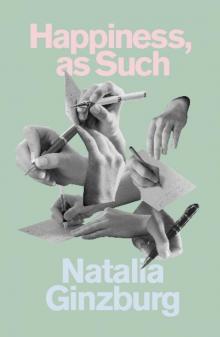 Happiness, as Such
Happiness, as Such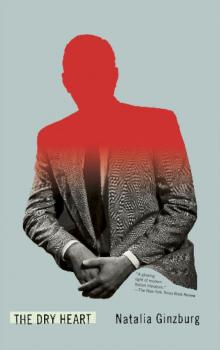 The Dry Heart
The Dry Heart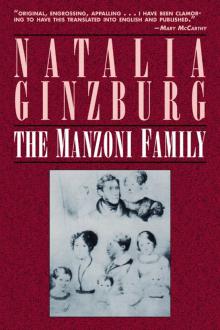 The Manzoni Family
The Manzoni Family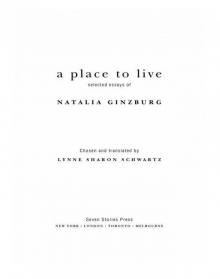 A Place to Live
A Place to Live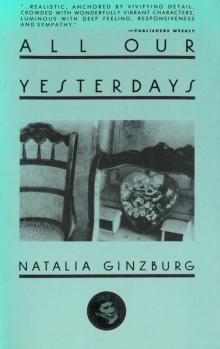 All Our Yesterdays
All Our Yesterdays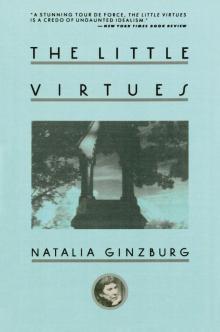 The Little Virtues
The Little Virtues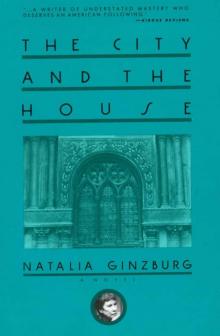 The City and the House
The City and the House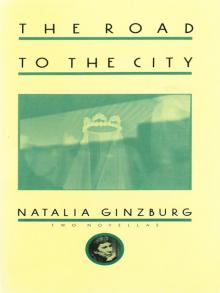 The Road To The City
The Road To The City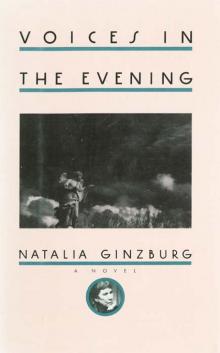 Voices In The Evening
Voices In The Evening